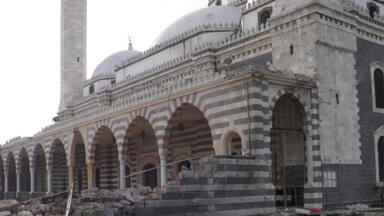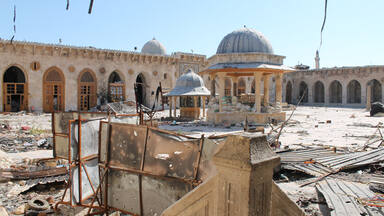Emergency Red List of Syrian Antiquities at Risk is launched in New York

On Wednesday, 25 September, UNESCO Director-General Irina Bokova joined the President of the International Council of Museums (ICOM), Dr. Hans-Martin Hinz, and United States Assistant Secretary of State for Population, Refugees, and Migration, Ms Anne Richard, to launch an Emergency Red List of Syrian Cultural Objects at Risk.
The event was held at the Metropolitan Museum of Art in New York City and also featured remarks from the Museum’s Director, Mr Thomas Campbell, as well as the President of the World Monuments Fund, Ms Bonnie Burnham.
Since 2000, in close partnership with UNESCO, ICOM has published 12 Red Lists for cultural objects at risk from across the globe.
The ICOM Red Lists facilitate the work of police, customs officials and all other professionals concerned with the protection of cultural property worldwide by helping them identify the categories of objects that are particularly vulnerable to illegal purchase, transaction and export. The Syrian Red List contains objects covering the most important periods of Syrian history: Prehistory and Ancient history, Islamic era and Middle Ages as well as Ottoman period.
Voicing her profound shock and distress at the loss of so many lives in Syria since the beginning of the conflict, Irina Bokova recalled the tragic and irreversible destruction of Syria’s unique heritage, from Aleppo to the world Heritage site of the Crac des Chevaliers.
“At UNESCO, we believe there is no choice to make between saving lives and saving cultural heritage. Protecting heritage is inseparable from protecting populations, because heritage enshrines people’s identities. Heritage gives people strength and confidence to look to the future -- it is a force for social cohesion and recovery. This is why protection of heritage must be an integral part of all humanitarian efforts” Irina Bokova stated.
Irina Bokova expressed a special thanks to the United States Department of State for its financial support, which enabled the development of this Emergency Red List. She also paid tribute to the US steadfast commitment in the fight against illicit trafficking of cultural property, particularly in the framework of UNESCO’s 1970 Convention on the Means of Prohibiting and Preventing the Illicit Import, Export and Transfer of Ownership of Cultural Property, and she expressed her hope that the United States of America will continue to stay fully engaged with UNESCO.
“Syria’s irreplaceable heritage can only be protected through a coordinated international response,” the Director-General emphasized. Highlighting UNESCO’s actions in this regard – including the organized technical meetings and trainings as well as the endorsed action plan aimed at preventing further losses and repairing damage to Syrian cultural heritage - Irina Bokova called for active cooperation from Syria’s neighbours, as well as from its police and customs partners, to stiffen efforts to fight against illicit trafficking.

